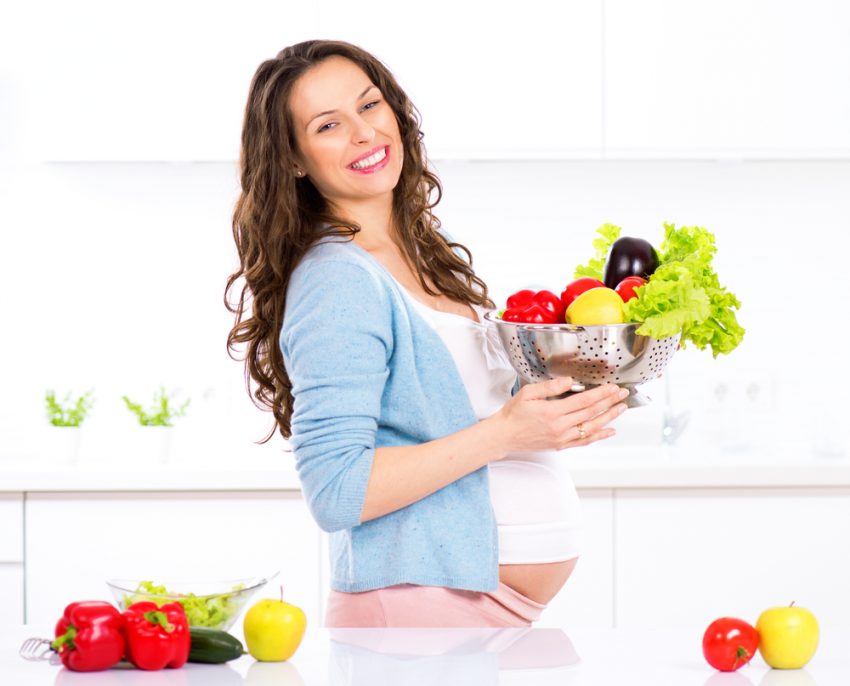Content written by The Organic Butler
There is no doubt that healthy, balanced diet is important for everyone. However, it is also hard to deny that quality nutrition is particularly important at certain life stages, pregnancy being one of the most important.
When you are pregnant, the importance of balanced dietary approach becomes more apparent than ever, as you are not only nourishing your own body, but also supporting growth and development of the new life generating within. Of course, first of all, this means that you need more energy (or calories), as your body is working much harder and desperately needs extra fuel.
However, it is important to note that simply increasing the amount of food eaten is not the most strategic way, as you don’t just need any extra calories – your individual nutrient requirements change as well. To name a few, you will need extra protein, calcium, folic acid, and many other vitamins and minerals.
Balanced, well thought-through meals are the best choice for you and your baby that will help you achieve the new nutritional goals. If you simply “eat for two”, there is a risk of gaining excessive weight during pregnancy, which will put unnecessary strain on your body which is already working very hard. Most women will need 300 extra calories a day (or more – consult a health practitioner for individual estimates), but those need to be full of beneficial nutrients; “empty calories” such as desserts won’t cut it, no matter how strong the dreaded “cravings” for those are.
The down math is quite simple – during pregnancy, you need to find a convenient way to add more nutritious foods into your diet without going overboard with extra “empty” calories (we strongly recommend having a chat with your preferred healthcare practitioner to estimate your individual requirements). If only there was an easy way to consume familiar foods whilst also getting more beneficial nutrients from such meals…
Great news – there is such way! Switching to organic nutrition will do just that, and today we’d like to discuss how it works.
What are organic foods?
Organic foods are produced without the use of synthetic chemicals or genetically modified components. Only certain pesticides are allowed in organic farming, including but not limited to pyrethrins, light oils, copper and sulphur, and biological substances such as Bacillus thuringiensis.
It’s important to note that organic farming is also sustainable and often incorporates traditional farming methods, such as crop rotation, which prevents nutrient depletion in the soil.
When it comes to organic animal products, animals used in organic farming are treated in accordance with strict humane practices and guidelines. Animals are also never fed any growth-regulating drugs, steroids, hormones or antibiotics.
There is a wide variety of organic products available in Australia such as fruit, vegetables, legumes, grains, meat and alternatives, eggs, dairy, honey and even packaged foods and meals. Plenty to choose from!
Why go organic during pregnancy?
We’ve mentioned several aspects of organic farming for a reason, as those practices explain amazing benefits of organic foods.
Remember – during pregnancy, your goal is to increase not only the amount of energy you consume, but also the amount of nutrients contained in the foods you put on your plate. Turns out, organic food is a perfect way to achieve that! Several fundamental studies (this one, for example) have explored the nutritional properties of organic foods and found that organically grown produce has more nutrients compared to conventional counterparts. For instance, some organic crops may be 63% higher in calcium, 73% higher in iron, 118% higher in magnesium, 125% in potassium and 60% higher in zinc compared to conventionally grown varieties. These are all crucially important vitamins and minerals that support growth and development of your baby.
It’s not only about what organic foods contain more of. We’ve mentioned above that pesticides used in organic farming are very different compared to “normal” practices. Ultimately, this leads to significantly lower content of pesticides and other harmful substances in organic produce. Mercury content, for instance, is 29% lower in organic crops – which is a pleasant statistic to see, considering that mercury exposure is a growing problem in the modern society. Babies appear to be particularly sensitive to mercury exposure, which may sometimes even lead to nervous system development impairments, as well as damage to lungs and kidneys of the developing organism. Of course, these are extreme cases, but why risk it if excessive mercury exposure from food can be easily avoided?
Excessive nutritional pesticides exposure is also potentially dangerous for your baby. A longitudinal study has linked childhood pesticide exposure to developing cancer later in life. Again, we are not aiming for a “health scare” here, as such studies only demonstrate links, not cause-effect relationships. However, the risk does exist, and since it’s so easy to minimise by simply switching to organic foods – what are the reasons not to do so?
Where to shop for organic foods?
Fortunately, gone are the days when finding organic produce in regular stores was virtually impossible. These days, organic foods may be found everywhere, from supermarkets to health stores, and they are usually clearly labelled, which further simplifies the shopping experience.
If you don’t feel like hopping between various stores to fulfil all your organic produce needs, subscription services that deliver delicious organic food straight to your doorstep may be a great option as well.
Conclusion
In summary, organic foods are a great choice for pregnant women, as they provide significantly more essential nutrients compared to conventional counterparts whilst also reducing exposure to potentially harmful substances such as pesticides.
Better for yourself, your growing baby and the environment, organic foods are great choice during pregnancy, breastfeeding…and any other life stage alike!
You might also like to read:









